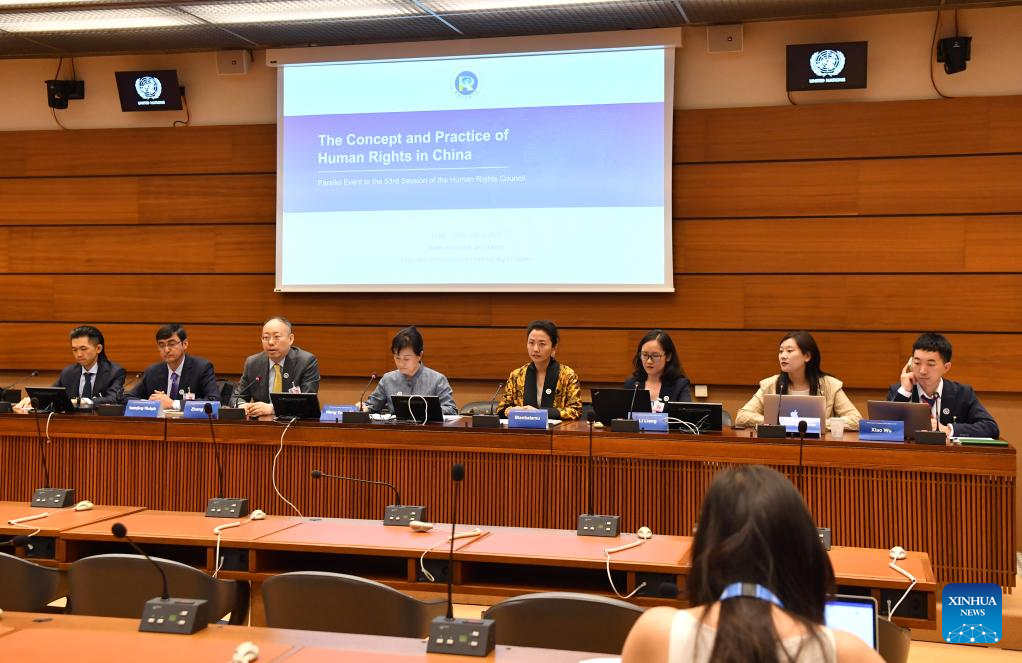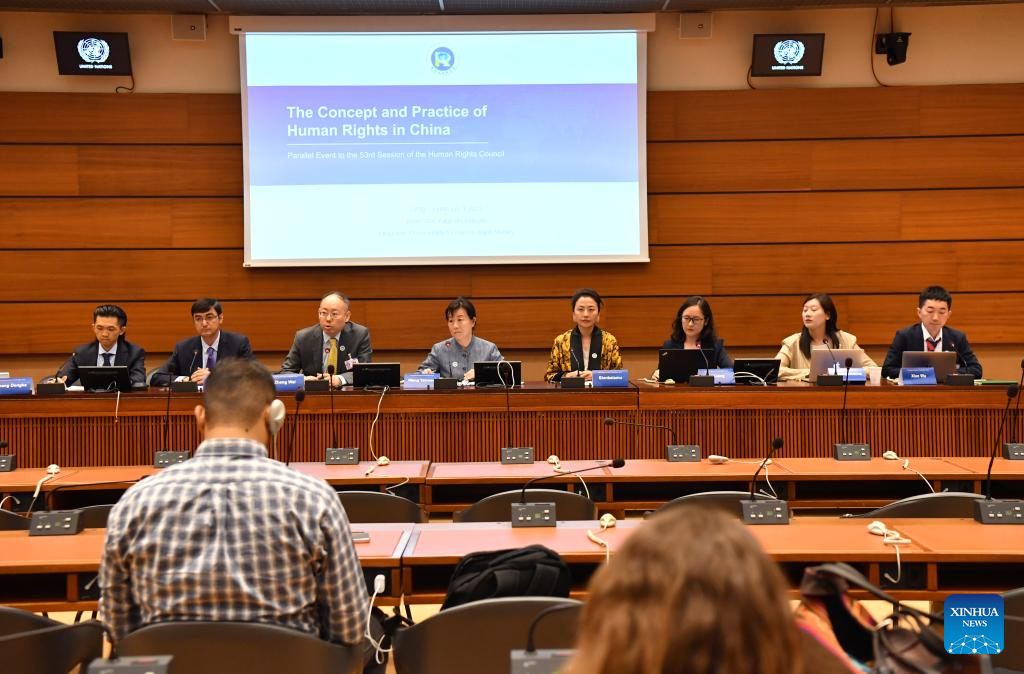Experts expound on China's concept and practice of human rights during UN session

China Society for Human Rights Studies holds a side event at which experts detail the concept and practices of human rights in China during the ongoing 53rd session of the United Nations (UN) Human Rights Council, at the Palais des Nations in Geneva, Switzerland, on July 3, 2023. (Xinhua/Lian Yi)
GENEVA, July 4 (Xinhua) -- During the ongoing 53rd session of the United Nations (UN) Human Rights Council, the China Society for Human Rights Studies on Monday held a side event at which experts detailed the concept and practices of human rights in China, at the Palais des Nations here.
Wang Yanwen, deputy secretary-general of the human rights organization, said in her opening address that global human rights governance should evolve towards a more fair, just, reasonable, and inclusive direction.
"In seeking consensus in a divided world, it is necessary to set aside biases and respect each other. Imposing one country's values on others will only increase instability, and blindly applying another country's human rights protection model can also be harmful," she said.
"A genuine civilization of human rights should be built on the recognition of the universality of human rights and the respect for differences in human rights concepts and practices. It is important to seek common ground while respecting differences and call on all countries and nations to inherit and develop their own civilizations, and independently choose a path of human rights development that suits their national conditions," Wang said.
On human rights education, Zhang Wei, executive vice president of the Institute of Human Rights at the China University of Political Science and Law, underlined the importance the Chinese government attaches to it.
In the four National Human Rights Action Plans, there are dedicated chapters on human rights education and research, which propose specific measures to promote the continuous development of human rights education, Zhang said at the event.
So far, China has established human rights education and training bases in 14 universities. According to the arrangements of the fourth plan, the Chinese government will support the establishment of national human rights research institutions in the Chinese Academy of Social Sciences and Party schools by 2025. Three new research bases will be set up as well.
Li Liang, a scholar from the School of Politics and International Relations of Lanzhou University, said Xinjiang's modernization drive has accelerated again since 2010.
A slew of measures promoting ethnic integration and de-radicalization were implemented, leading to a profound ideological liberation of women in Xinjiang, Li said. Colorful dresses, jeans and suits have made a comeback on the streets of small towns and villages there, igniting a great resurgence of vitality among women in the region.
Suolang Zhuoma, an assistant researcher at the China Tibetology Research Center, told Monday's event that the Chinese government has unveiled the Regulations on Religious Affairs and the Measures on the Management of the Reincarnation of Living Buddhas in Tibetan Buddhism to respect and protect such way of inheritance of Tibetan Buddhism.
She believed that in accordance with the measures, China's Tibet and other places have identified and trained many new reincarnated living Buddhas who love the country and the religion. It has guaranteed the inheritance of Tibetan Buddhist culture, met the basic religious needs of the believers, and become a great practice in the development of human rights in Tibet.
Xiao Wu, associate professor at the Human Rights Research Institute of Southwest University of Political Science and Law, said that China's human rights cause is an integral part of Chinese modernization.
China maintains that the right to subsistence and the right to development are fundamental human rights, emphasizing the inseparability of civil and political rights and economic, social, and cultural rights, Xiao said.
China upholds a people-centered view of human rights rather than a narrow and one-sided view of human rights. It adheres to a multidimensional path of human rights development rather than a one-dimensional approach. China embraces an inclusive concept of human rights rather than a condescending view of human rights. China advocates exploring a path of human rights development that suits its own national conditions and the needs of its people, Xiao added.
Nasierjiang Yibulayin, associate professor at the School of Law and Politics of Kashi University in Xinjiang, said at the event that the Chinese Constitution and laws have fundamentally established legal barriers to prevent "forced labor."
People of all ethnic groups in Xinjiang have the freedom to choose their professions. The rights of laborers from all ethnic groups, such as the right to fair remuneration, the right to rest and vacation, the right to labor safety and health protection, and the right to social security and welfare, are all protected by law, the professor said.
Zhang Dengke, a scholar at the School of Chinese Language and Literature of Xinjiang University, told the audience that as a language researcher and local resident, he constantly experiences the full protection of the diversity of local languages and scripts in Xinjiang.
Currently, more than 10 languages and scripts are used by various ethnic groups in Xinjiang. Minority languages and scripts are widely used in areas such as the judiciary, administration, education, press and publication, broadcasting, television, the Internet, and public affairs.
Bianba Lamu, a researcher at the Chinese Academy of Social Sciences, stressed that Tibet has always been an integral part of China's territory since ancient times, and the various ethnic groups of China have jointly created its history.
In modern Chinese history, the central government has always exercised sovereignty and had jurisdiction over Tibet.
Hostile Western forces that advocate "Tibetan independence" disregard the development history of all Chinese ethnic groups, including the Tibetan people. Their purpose is nothing more than to confuse the public, infiltrate and undermine China's national unity, and hinder China's development under the guise of ethnic separatism, the researcher said.

China Society for Human Rights Studies holds a side event at which experts detail the concept and practices of human rights in China during the ongoing 53rd session of the United Nations (UN) Human Rights Council, at the Palais des Nations in Geneva, Switzerland, on July 3, 2023. (Xinhua/Lian Yi)
Photos
Related Stories
- Envoy emphasizes China's endeavor to promote international human rights cause
- China protects human rights through concrete actions
- Pakistani researcher hails China's practical efforts to make all human beings better off
- To create secure, peaceful environment for realizing human rights
- China advocates safeguarding human rights through security, promoting human rights through development, promoting human rights through cooperation
Copyright © 2023 People's Daily Online. All Rights Reserved.









